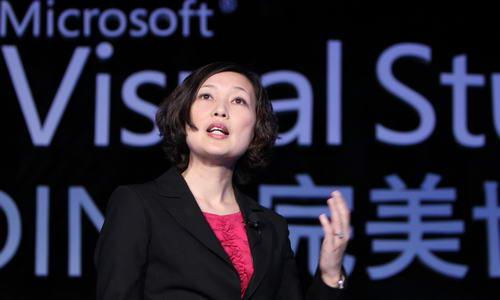Microsoft exec has simple wish to make more Chinese friends
BEIJING - In the year 1987, 17-year-old Pan Zhenglei took her parents' advice to see the world outside China and got on a plane.

Pan Zhenglei is the highest-ranking female Microsoft executive born in China. [PROVIDED TO CHINA DAILY]
In Seattle, Washington, Pan was impressed by all the overpasses, expressways and supermarkets that were rare in China in the 1980s. But one thing she did not like was the feeling of loneliness in a crowd of people from different countries.
"I wanted to make more Chinese friends, because we had mutual interests," Pan said.
Two decades later, Pan's simple wish of making Chinese friends has turned into a networking group with more than 2,500 members.
Pan, the highest-ranking female Microsoft executive born in China, founded a Chinese employee group along with a few others in 1992, the same year she joined Microsoft. The name of the group is Chinese Employees at Microsoft (CHIME).
It is now one of the largest social groups at Microsoft. Although Pan doesn't run CHIME directly, she keeps her hand in by acting as an adviser.
"It was fulfilling to watch CHIME grow and see how Chinese people take part at Microsoft, which has become increasingly diverse," she said.
Pan joined Microsoft as a software developer of Office. Today, she leads a production team with 200 members in the United States and another 100 engineers in Shanghai.
"There are not many general managers with a Chinese background at Microsoft, because very few Chinese students were able to study in the US until the late 1990s. The number of Chinese executives will certainly increase in the next few years," she said.
According to Pan, there were only 10 Chinese undergraduate students when she was in college at the University of Washington and seven Chinese employees in her first year at Microsoft.
"Humans are social beings and anyone in such circumstances would feel lonely," Pan said.
In order to create occasions for Chinese employees to establish social networks, Pan started a small group that held social gatherings on weekends.
In the group's first few years, Pan said it was easy to organize activities, because the number of people involved was small. She only had to discuss with the group's other founders what activities Chinese employees would enjoy and how to find financial support.
When the group grew to more than 100 members, a budget shortage surfaced. Fortunately, the company was pouring more and more money into social groups.
"Microsoft started to take diversity and inclusion more seriously as the company grew and matured in the late 1990s," Pan said. "After all, the success of Microsoft depends on the diverse skills, experiences and backgrounds of its employees.
"It was like a mechanism - the more social groups there are, the stronger support the company gave to these groups," she said.
As CHIME's membership continued to rise, Pan and her colleagues thought the group could offer more than socializing. A few months later, a board of directors was established to promote Chinese cultural awareness and assist employees with career development.
"More often than not, I find many Chinese don't communicate often enough with their team members and managers. They just bury themselves in their work, which can make their managers think they are less proactive," Pan said.
So she started to organize career talks for CHIME, in which managers from different disciplines and divisions shared their experiences.
She recently shared her own opinions with the group. "Chinese employees are smart and usually more diligent than others. We should look at how to use the things we learned from our culture in a better way," she said.
Pan was born in China and stayed in Beijing from the age of eight until she went to the US.
"Studying in China gave me a lot of perspective that I did not understand at the time," Pan said. "I am especially grateful for the solid foundation I received in elementary and secondary school."
Upon arrival at the University of Washington, Pan was required to take an entrance exam. Although she had some difficulties with English terms in the math exam, "the ability to reason that I acquired in China allowed me to reverse engineer the problems and my test score was almost perfect", Pan said.
Her interests in Chinese culture accompanied her career progression.
"Chinese culture emphasizes balance, which is of great importance when you are trying to coordinate people's different interests and keep things working well," she said.
As a mother, Pan said her biggest wish in life is for her son to learn Chinese. So, a year ago she decided to move back to Shanghai.
Although she has had to double her efforts at work to take care of her teams in Shanghai and Seattle, she said the endeavor has been worthwhile.
"I hope my son can speak Chinese and read Chinese books, because Chinese culture has a long history and is profound. He won't understand it well if he doesn't speak the language," she said.





